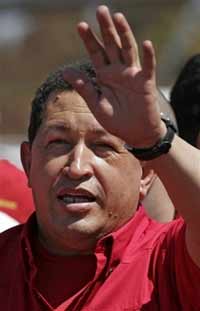Hugo Chavez’s visit to Russia triggers wave of Western criticism
Venezuelan President Hugo Chavez arrives in Moscow with an official visit. The Venezuelans leader is going to discuss issues of arms shipments, the energy market cooperation, as well as questions regarding the establishment of a Russian-Venezuelan bank.

Chavez is said to meet Russian officials to discuss questions of purchasing Russian tanks and other military hardware for the needs of the Venezuelan Armed Forces.
Hugo Chavez also plans to discuss an opportunity to set up a Russian-Venezuelan bank that would subsequently work with the funding of joint projects. The Venezuelan government has already introduced necessary amendments in the national legislation about the Central Bank.
Hugo Chavez has been strengthening economic ties with other countries as well. The Venezuelan president urged members of the recent PetroCaribe summit to set up IMF-independent financial institutions with such countries as Russia, Belarus, China, India and Iran.
The Venezuelan president believes that it is time one should set up a strategic energy alliance with those countries. Chavez exemplified his point of view with the recent establishment of the Chinese-Venezuelan Development Foundation with the capital of $6 billion.
When the USA imposed the arms sales embargo on Venezuela in 2006, Russia became the key supplier of arms to this nation. The amount of all defense contracts concluded between Russia and Venezuela amounts to $4 billion. Russia has already shipped 100,000 Kalashnikov assault rifles of the new AK-103 modification to Venezuela.
In addition, Venezuela is building two plants to assemble Russian assault rifles and produce ammunition to them.
The Venezuelan president has earned the reputation of a tough man, who strictly follows the interests of his state. For example, Chavez has either forced Western oil companies out of Venezuela or made them work for his country.
US largest oil companies, Exxon Mobil и ConocoPhillips, were deprived of their oil rights in Venezuela. As a result, they lost the oil extraction of about 130,000 barrels a day, or 5.5 percent of the entire oil output.
Chavez nationalized the oil industry of Venezuela. Western oil companies were supposed to hand over a share (not less than 60 percent) in high-yielding oil projects. The projects include four large oil deposits with the total output of 600,000 barrels a day. The cost of those projects is evaluated at $31 billion. ConocoPhillips’s assets in Venezuela cost more than $10 billion. The government offered minority shares in three oil-extracting projects to the companies as a compensation.
USA ’s Chevron Corp., Britain’s BP Plc, France’s Total SA and Norway’s Statoil ASA agreed with Chavez’s suggestions. As a result, Venezuela’s Petroleos de Venezuela (PDVSA) currently controls the oil extraction in the basin of the Orinoco River - 78 percent. It is worthy of note that Venezuela provides 11 percent of USA’s oil consumption.
Chavez decided to expand contracts with Russia. Russian companies have started to develop Venezuelan oil fields. Russia’s Lukoil found its first oil in the country at the end of 2006. Gas giant Gazprom obtained the license for the development of natural gas deposits in the Gulf of Venezuela in 2005.
Needless to say that Chavez’s visit to Russia will be successful. However, Russia will have to deal with a wave of criticism from the West.
AP photo
Vladimir Anokhin
Pravda.ru
Subscribe to Pravda.Ru Telegram channel, Facebook, RSS!





